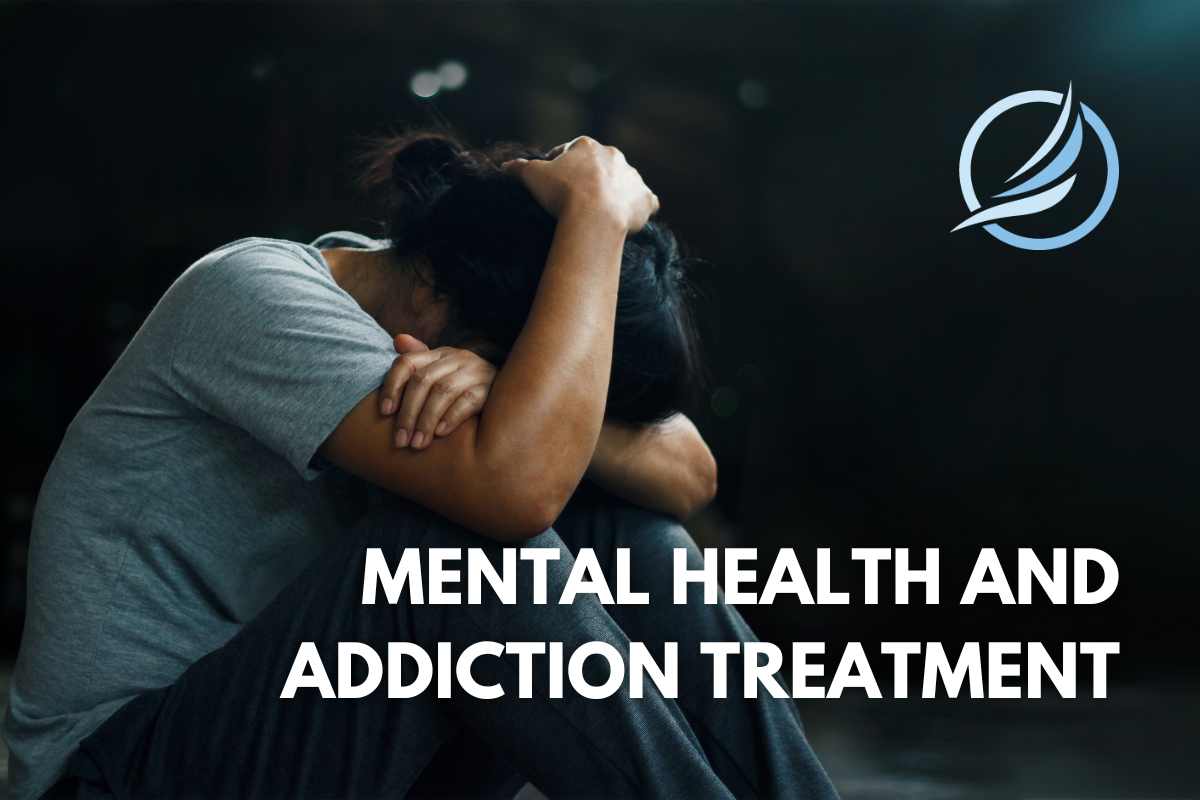May is Mental Health Awareness Month, a time to recognize the link between mental health and addiction recovery. While experts are aware of this relationship, many people are not, leading to a lack of awareness about the nature of their condition and addiction treatment.
Let’s explore the connection between mental health and addiction to understand how to manage and overcome their symptoms, and how to locate addiction treatment centers leading to a strong foundation for long-term recovery.
The Role of Mental Health in Addiction Treatment
Mental health and addiction have a well-known but complicated relationship that manifests differently for everyone. For example, some people with mental illnesses like depression or anxiety turn to substances to cope with the daily symptoms.
On the other hand, people with addiction are highly likely to develop a mental illness as they become more dependent on substances. In both cases, mental illness and addiction feed into each other, leading to a vicious circle where the illness worsens the addiction, and the addiction worsens the illness.
There are many reasons for this relationship, and it’s unclear which came first. Regardless, experiencing co-occurring mental illness and substance use disorder (SUD) is known as “dual diagnosis,” and the National Institute of Mental Health (NIMH) proposes three main reasons for their relationship:
- Mental illness and SUDs have similar risk factors, such as genetics and environmental factors like stress and trauma.
- People with mental illness may self-medicate with drugs.
- People with addiction may experience brain changes that make them more likely to be mentally ill.
In some people, the mental illness comes first and then the addiction, but it’s the other way around for others. Ultimately, which came first is not as important as accurately diagnosing and treating both conditions.
What Is Dual Diagnosis and How Common Is It in Addiction Recovery?
Dual diagnosis is when someone experiences both a substance use disorder and a mental health disorder at the same time. Such diagnoses present unique challenges in diagnosis and treatment, as professionals must address both disorders simultaneously to provide the best chances of recovery.
According to data from the Department of Health and Human Services (HHS), dual diagnoses are common, with 13.5% of young adults aged 18-25 having both a substance use disorder and a mental illness in the past year.
The most common mental illnesses that co-occur with addiction include:
- Anxiety
- Depression
- Bipolar disorder
- Post-traumatic stress disorder (PTSD)
- Bipolar disorder
- Schizophrenia
- Attention-deficit hyperactivity disorder (ADHD)
Additionally, nearly 1 in 3 adults had either a substance use disorder or a mental illness in the past year, and 46% of young adults 18-25 have had either a substance use disorder or a mental illness. These numbers underscore the importance of providing integrated treatment plans that address both mental health and substance use disorders.
The Impact of Codependency on Recovery
Codependency is the unhealthy practice of prioritizing someone else’s physical and emotional needs over your own in the context of an interpersonal relationship (romantic or otherwise). It’s a common issue among people with addiction and those helping a loved one get through addiction.
People with codependency often have low self-esteem, people-pleasing tendencies, unhealthy boundaries or no boundaries at all, and an obsessive approach to relationships where they define themselves by their relationships.
Codependency can manifest in the context of addiction when a loved one is struggling with addiction or when both members of a couple are abusing drugs. In particular, children of parents who use drugs are at risk of becoming codependent, especially if they end up caretaking for their parents.
This dynamic can lead to greater risks of mental illness and addiction for the codependent person, as their condition limits their ability to fulfill responsibilities outside the relationship and may isolate them from friends, partners, and family members, leading to a spiral.
The Importance of Mental Health Awareness in Addiction Recovery
Increasing mental health awareness of addiction plays a crucial role in reducing stigma and fostering understanding of mental health issues and addiction. By raising awareness, individuals and communities can support those struggling with these challenges and promote a more compassionate approach to recovery.
Some of the benefits of increased mental health awareness in addiction recovery circles include:
- Early dual diagnoses help people seek help sooner.
- More accessibility to integrated treatments.
- Educating those with dual diagnoses about their condition and treatment options.
- Better, more informed support systems for people with dual diagnoses.
- Potentially reducing the risk of relapse by helping individuals manage their long-term symptoms.
- Preventing Relapse: Understanding the triggers and signs of mental health issues can aid in relapse prevention. By managing mental health effectively, individuals in recovery can maintain stability, reducing the risk of relapse into substance use.
People in addiction recovery can access these benefits if individuals and organizations make an effort to increase awareness about the role mental illness plays in substance abuse.
Integrating Mental Health Care in Addiction Treatment
Holistic approaches to addiction treatment that include mental health care are essential for addressing the root causes of dual diagnoses. Some of the available treatments for people with co-occurring mental illness and addiction are:
- Medication-assisted treatment (MAT). MAT involves medication to help manage alcoholism and mental illness symptoms, counseling, and behavioral therapy. The drugs may include antidepressants, anti-anxiety drugs, and medication to reduce alcohol cravings. However, keep in mind that medication for alcoholism is less common than for mental illness and may not be available near you.
- Cognitive-behavioral therapy (CBT). CBT helps individuals identify negative thoughts and behavioral patterns contributing to alcoholism and mental illness. It also teaches coping skills for managing triggers and preventing relapse.
- Holistic therapies. Combining traditional medication-assisted and behavioral treatments with holistic alternatives like yoga, meditation, and acupuncture may help manage symptoms for both conditions.
These integrated treatment plans have a higher chance of positive outcomes because they consider the multiple factors involved in the dual diagnosis rather than focusing only on one of the conditions.
Manage and Overcome Mental Illness and Addiction Recovery
As we observe Mental Health Awareness Month, let us remember the importance of recognizing and supporting those struggling with addiction and mental health disorders at the same time.
By working together to break the stigma and provide comprehensive care, we can create a more supportive environment for all individuals on their journey to recovery. So, if you or anyone you know is experiencing substance abuse and has symptoms of mental illness, we encourage you to seek help.
The first step is daunting but lays the foundation for future recovery. Learn more about The Freedom Center’s addiction treatment program today!

































